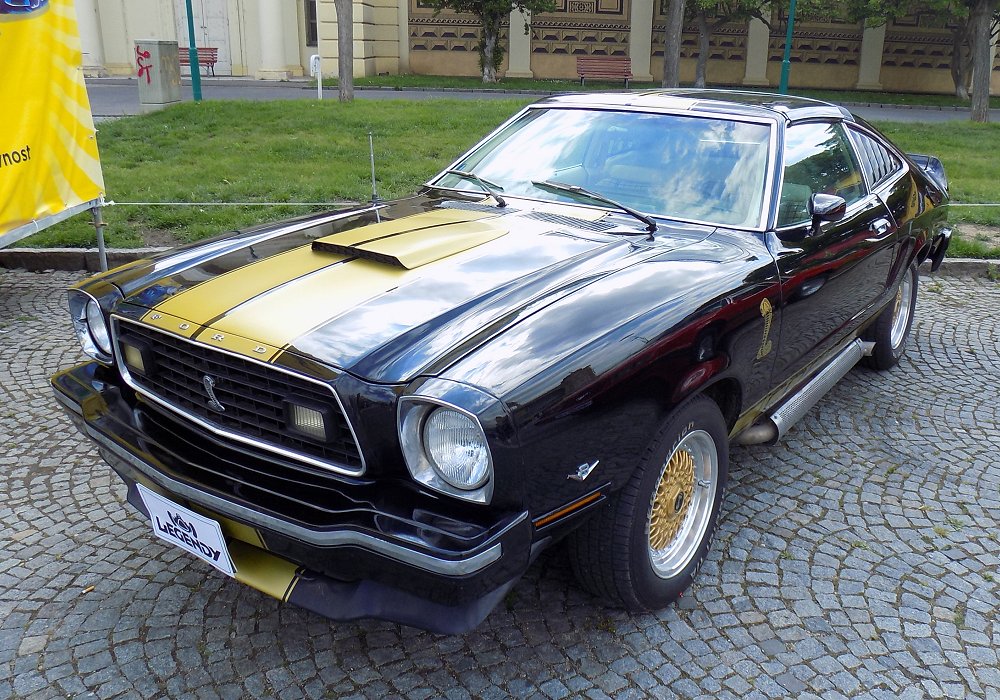Description
The Ford Mustang Cobra II was introduced in 1976 as a way to bring excitement and performance-inspired styling back to the Mustang II lineup. While the second-generation Mustang was smaller and more fuel-conscious than the original models, many enthusiasts felt it lacked the visual drama and muscle car spirit that had defined the nameplate. The Cobra II package was Ford’s answer, offering aggressive graphics, sporty design cues, and the option of V8 power, even if its actual performance was still constrained by mid-1970s emissions regulations.
Visually, the Cobra II was designed to grab attention. Based on the hatchback body style, it came with bold stripes running across the hood, roof, and decklid, along with Cobra II lettering and snake decals on the sides. Many cars were finished in bright white with blue stripes, a look that recalled Carroll Shelby’s 1960s racing Mustangs, though other color schemes were available. A front air dam, rear spoiler, and louvered rear windows enhanced the sporty character, while optional hood scoops and styled wheels completed the aggressive appearance. These touches made the Cobra II stand out in traffic and gave it the muscle car image buyers still craved.
Inside, the Cobra II shared much with the standard Mustang II, but the sporty trim helped set it apart. Bucket seats, a floor-mounted shifter, and unique detailing gave it a purposeful look. Buyers could opt for luxury upgrades like air conditioning, power steering, upgraded radios, or the deluxe Ghia-style interior, meaning the Cobra II could be configured as either a stripped-down sporty coupe or a more comfortable personal car with flair. While the cabin wasn’t radically different from other Mustang IIs, the emphasis on sport made it feel more in line with the car’s performance image.
Under the hood, the Cobra II could be equipped with a range of engines. The base powerplant was the 2.3-liter inline-four, followed by the 2.8-liter Cologne V6, but the real draw was the 302 cubic inch V8. Rated at around 139 horsepower, the V8 gave the Cobra II stronger performance than the smaller engines, though it was still far from the muscle cars of the late 1960s. Buyers could choose between a four-speed manual or a three-speed automatic transmission, with most performance enthusiasts preferring the manual to make the most of the V8’s torque.
On the road, the Cobra II delivered decent acceleration and a more engaging driving experience compared to the base Mustang II. While it wasn’t fast by earlier Mustang standards, it gave buyers a sense of performance with its throaty V8 sound, rear-wheel-drive layout, and sporty styling. Its suspension was tuned more for comfort than sharp handling, but the lighter weight of the Mustang II platform made it easier to maneuver in urban driving, and the performance image more than compensated for its modest capabilities.
Priced higher than the base Mustang but still within reach of younger buyers, the Cobra II became a popular option during the late 1970s. Its Shelby-inspired graphics and sporty image tapped into Mustang nostalgia at a time when raw performance was no longer possible, helping Ford maintain excitement around the nameplate.
Today, the Ford Mustang Cobra II is remembered as a distinctive product of the 1970s, reflecting both the challenges of the era and Ford’s creativity in keeping the Mustang appealing. While its performance numbers may not rival earlier or later models, collectors now appreciate it as a rare and stylish version of the Mustang II. Surviving examples, particularly V8-powered cars with original graphics and options, are increasingly sought after as quirky but charismatic representatives of the Mustang’s enduring appeal during a transitional time in automotive history.
